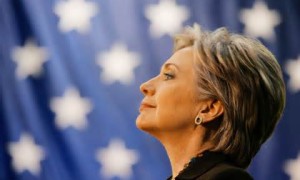Labor Gives Clinton Room to Maneuver on Trade Talks
< < Go Back
Democratic front-runner has remained neutral on a hotly debated issue.
Michael Collins, a nurse and active member of his local union, isn’t happy about free-trade legislation being debated in Congress, believing it would undermine American workers. It won’t, however, change his view of Hillary Clinton, a one-time booster of the pact.
In the 2016 presidential race, “Hillary’s about the only person we’ve got who’s viable,” he said.
Labor unions are fighting hard to defeat legislation that would authorize sped-up consideration of a trade agreement being negotiated with 11 Pacific Rim nations. However, they are giving Mrs. Clinton the kind of breathing room they aren’t affording congressional Democrats or even the president.
Mrs. Clinton as a senator voted in support of several free-trade agreements, and opposed one, with Central American nations. As secretary of state, she supported the Pacific Rim negotiations, and her former boss, President Barack Obama, is leading the effort to approve them.
But in recent weeks, as the Trans-Pacific Partnership took center stage in the Senate and opened schisms within the Democratic Party, Mrs. Clinton has maintained steadfast neutrality. She issued one statement and answered one question on the matter. In neither case did she pick a side.
“Any trade deal has to produce jobs and raise wages and increase prosperity and protect our security,” she told reporters in New Hampshire last month. “We have to do our part in making sure we have the capabilities and the skills to be competitive.”
Mrs. Clinton has previously recalibrated her stance on free-trade agreements. In her 2003 memoir “Living History,” she spoke approvingly of the North American Free Trade Agreement negotiated by her husband in the early 1990s. But as a presidential candidate in the 2008 race, she said the way Nafta was implemented “has hurt a lot of American workers.”
The United Auto Workers represented about 1.5 million workers in the late 1970s; today, its membership is about one-third of that. At the same time, membership in unions filled with public-sector workers has remained relatively stable.
“The great old unions of the past—the steelworkers, the auto workers—these unions are seen as shadows of themselves,” said Gary Chaison, professor of industrial relations at Clark University in Worcester, Mass. On trade, “Hillary Clinton really does have much more ground to operate on, because it’s not the issue it once was.”
Even manufacturing unions won’t criticize Mrs. Clinton on the issue, despite their vocal opposition to the trade bill itself.
More From The Wall Street Journal (subscription required):




